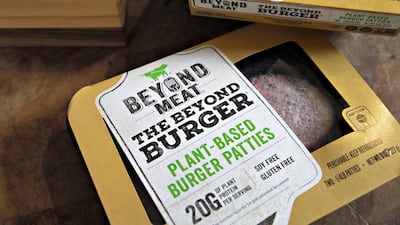Hoping to find the next Beyond Meat, venture investors have more than doubled their bets on alternative protein makers this year, raising more than $1 billion (Dh3.67bn) for start-ups that focus on everything from lab-grown meat to protein derived from volcanic microbes.
More than 20 faux meat start-ups raised about $1.4bn from venture investors in the first seven months of 2020, according to a report on Monday from London-based investor network Farm Animal Investment Risk & Return, known as Fairr.
Venture investments in plant-based meat and dairy alternatives soared to $1.1bn this year, up from $457 million in all of 2019, while investments in companies that grow cell-based meat more than tripled to $290m from $75m last year. The venture investors backing this space range from major food companies like Cargill and General Mills to pension funds, traditional venture capital firms and individual investors like Bill Gates and Oprah Winfrey.
As a group, they are betting that faux meat and dairy can scale up production quickly to meet a new generation of climate-conscious consumers that want to reduce the impact of livestock on the planet, according to Marisa Drew, head of the impact advisory and finance group at Credit Suisse Group. Plant-based and cell-based meat require a fraction of the water and energy used to manage livestock, but companies also have to invest heavily in marketing and technology to help replicate the look of a hamburger or the texture of seafood.
“At the end of the day to reach scale in this space, you have to deliver something that is as tasty as meat to get consumers to switch,” Ms Drew said.
Venture investors are hoping to echo the performance of Beyond Meat, whose shares are up about 400 per cent since its initial public offering in May 2019, so they’re backing a wide variety of start-ups as it’s unclear which protein will catch on most with consumers, Ms Drew added.
This year’s biggest funding deals included Beyond Meat rival Impossible Foods, which raised $500m to support expansion of its vegan burgers, and Swedish oat-milk maker Oatly, which raised $200m this month in a deal backed by Blackstone Group that values the company at $2bn.
Investors also are providing financial support to alternative protein makers that aren’t as widely available to consumers, including $161m for Memphis Meats, which grows cultured meat from cells in a lab, and $80m to back Nature’s Fynd, an alternative protein developed from a volcanic microbe discovered in Yellowstone Park.
Venture bets in the space are still risky as the crop of start-ups mature and compete with each other for customers. There’s also the increasing presence of big food companies such as Tesco and Unilever, which now have teams dedicated to plant-based food, according to Fairr.
Faux meat has been flying off the grocery shelves amid concerns about meat processing and the coronavirus. Plant-based meat purchases rose 264 per cent this year, according to Nielsen. The market for alternative meat will probably reach $17.9bn globally by 2025, Fairr said.

